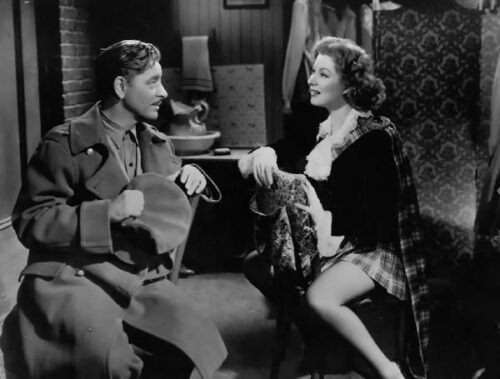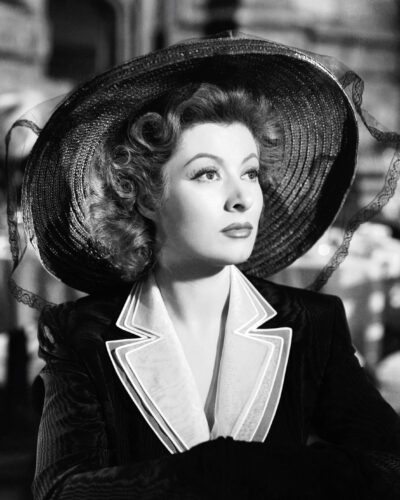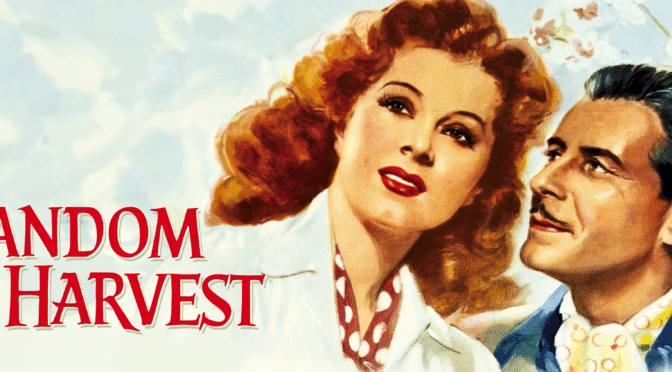While the shock of battle is as ancient as warfare, the months that extended into years of the men trapped in trench warfare during World War I caused horrific injuries, PTSD, and for our film’s protagonist, a complete loss of memory. Ronald Colman plays John Smith – the name given him in the Melbridge County Asylum where he has been living for months, as the amnesiac, barely speaking, former British officer under the care of Dr. Benet. His forlorn condition is dramatized when two parents visit to potentially identify him as their son. His hope and yearning quickly turns to anguish as their disappointment turns them away.
It’s only the noise of festivities that draws him out, past a guard at night, wandering into town. WWI has ended, and everybody is celebrating in the streets. But the noises are echoes of bombs to him, and he finds shelter in a tobacconist’s shop. A customer, Paula Ridgeway as played by Greer Garson, senses his bewilderment and escorts him outside. They part, but when she sees him again clutching a railing, she joins him and escorts him to her dressing room at a dance hall. He confesses his condition to Paula. He doesn’t know his name but says they called him John Smith. She calls him “Smithy.” Paula is a popular singer and entertainer, who sings “She’s Ma Daisy” with other chorus girls. Paula had him sit on a balcony to watch the show after she changed into her costume.

After the show Paula goes back to find Smithy prostrate and unconscious on the floor. With help she gets him into a hotel where a doctor treats him. Before long the Asylum Guard starts talking about an inmate that escaped. Paula tells Smithy he should return – but his look of dejection convinces her that she should run away with him. They travel to the small town of Devon, where she gets a job as a typist and he starts writing. They fall in love there, and although his memory doesn’t improve, they marry, and have a son. One day Smithy receives a telegram from the Liverpool Mercury, offering him a job. He is elated and Paula is happy for him. She packs his suitcase with his few articles of clothing, and stays at home with their toddler son, while he takes the train to Liverpool. He lodges at a cheap hotel and the next morning looks for the Mercury offices. On this rainy day a newsboy points to this office across the street, no sooner does he begin to cross than two cars bump into each other and one knocks him down. He regains consciousness in an apothecary shop, where a police officer and a couple of men are asking him questions. Is he ok, where was he going? He asks where am I, what am I doing in these civies (clothes)? When they ask who he is, he answers, “I am Charles Rainier, Captain of the Wessex Regiment.” “What are you doing in Liverpool?” He says he should be in the trenches. They answer it’s November 14, 1920.
Smithy regained his memory as Charles Rainier, but has no memory of the preceding three years – of the Asylum – of Paula – nor of their marriage. But he knows where his home was, Random Hall. He returns upon the death of his father, and finds his relatives waiting to hear of their share of the estate. They all thought he was died at the front lines – his return not completely welcome. Except by Kitty, the stepdaughter of Charles’ elder sister, who immediately starts flirting with him. Charles retains his ancestral home, and runs the family industrial business. Kitty grows older and courts him.
Spoiler Alert
While running the family industrial business, Charles had hired a personal secretary by the name of Margaret Hanson. One day while talking she admits to him that she had applied for the job after seeing his photo in the newspaper. Charles does not recognize that Margaret is Paula the woman he married.

She says nothing about this but later becomes distressed when Charles says he will be taking time off – time in which he will get married to Kitty. The life-blood drains from Margaret’s face as she sinks into sadness and heartbreak. Charles has often toyed with a key that is attached to his vest pocket chain. Margaret recognizes it as the key to their old cottage – and she watches as his expression seems to search for an old memory. Later when Charles and Kitty visit the church in which they are to marry, they listen to the music they are to choose for their service. One piece sends Charles into a reverie, and Kitty realizes that there is something or someone that stands between them. She breaks off their wedding.
Charles decides to return to Liverpool in an attempt to find clues about his missing years. While there, Margaret/Paula is dispatched to report to him that he has been selected to run for Parliament. After she joins him, she also helps him retrace his steps, finding the hotel where he stayed and asking if there was unclaimed luggage. But even his own suitcase and its contents bring no memories. At his campaign party he sits with Margaret. He now knows that he needs a wife, and remarking on her beauty, asks her to marry him. She seems happy, but hesitates in answering him.

Margaret has been visiting Dr. Benet, who first treated Smithy in the Asylum, and asks for his opinion. Dr. Benet thinks she will be hurt, but he loves her also. Yet Margaret loves Charles, so she consents to the marriage. They become Sir Charles and Lady Rainier.

On their third anniversary Charles gives Margaret a valuable necklace of emeralds. While it looks marvelous on her décolleté evening gown. Charles perceives a lack of joy. “Are you Happy Margaret?” he asks. She answers perfunctorily and Charles moves away. Margaret looks in her drawer for an old necklace that Smithy had given her, and begins to cry. When Charles returns, he asks her about the necklace. “He gave them to me because they were the color of my eyes.” She tells him, “Your capacity for love – your whole joy for living is buried in a little space of time that you’ve forgotten.” Margaret also tells him that she’d like to travel, that she needs a holiday. On amical terms Margaret takes a train the next day to Devon. Meanwhile Charles learns about a potential labor strike at his company plant in Melbridge. He travels there with his assistant. After he settles the issue to the workers’ satisfaction, he and his assistant go out into the street, and Charles says to him, there’s a tobacconist around the corner. “I thought you had never been here before,” his assistant says. Once inside the shop, faint memories break through, but there are other paths to follow before the pieces of memory become a whole.

Random Harvest received seven Academy Award nominations, including Best Picture, Best Director for Mervyn LeRoy, Best Actor for Ronald Colman, Best Supporting Actress for Susan Peters (Kitty), and Best Writing/Screenplay. Greer Garson was separately nominated for Best Actress for Mrs. Miniver, which she won. The Best-selling author James Hilton wrote the novel the film was based on. Although “Random Hall,” was the ancestral home of Charles Rainier, the film’s title came from a World War I German Official Report stating: “bombs fell at random” describing conditions on the battlefield. Ronald Colman was one of those English trench-fighting, wounded “Tommies.” The film was one of M-G-M’s biggest hits of the decade. It ran as an exclusive for 12 weeks at the Radio City Music Hall, setting a record at the time a for their longest-running film. The theater had to open the box office at 7:45 a.m. to satisfy the demand. It was Greer Garson’s favorite film, and Colman stated he hated to see it end at the wrap. Random Harvest is also one of classic film’s most poignant love stories – and a weeper. My only criticism is when Smithy wanders from the Asylum and into the streets of Melbridge, nobody seems to recognize his problems. At that point at the end of World War I, England, as with many countries in Europe, would have had hundreds of thousands of shell-shocked veterans, enough for every small town to have had them. But then again, that was plotted for Paula to find Smithy.
This post is part of the Classic Movie Blogger Association “Cry Me a River: Tearjerkers” Blogathon May 12-16. Check out here for the other Member posts.
Views: 182


Love this movie! It’s even fun watching Greer Garson sing, although it definitely wasn’t her forte. Her performance here is perfect.
I agree Rebecca, she did a pretty good job of playing the entertainer – which I understand she had fun doing. Thanks for your comment.
Greer Garson and Ronald Colman are perfectly cast here, aren’t they? Like several commenters have said, they handle the script with delicacy and sensitivity. And the film’s ending!! It is unforgettable. Really enjoyed your review.
Thanks Ruth, it was a perfect pairing of these two veteran actors – with a plot and ending that had to grab you. Thanks for the compliment.
Lovely story about a lovely film. Thanks for bringing it to the attention of those who may never have seen it. I also appreciate the background you have at the end of your story – I did not know the meaning behind “Random Harvest.”
– Toni R.
Thanks for your comment Toni. It it such a fine film with a wrenching plot. Happy to know you learned something new.
Well done, Christian. This movie is one of my favorites. I love the stunning moment when his secretary walks in and we see who it is. Always elicits a gasp.
Thanks Jacqueline. Yes, what a great and surprising scene that was – drawn out to keep us guessing as to how it would end.
One of my favourites. A lovely review, Christian.
Ronald and Greer are at their best here. Ronald captures the gentleness and fragility of Smithy perfectly. Greer is ethereal.
The ending gets me every time.
Maddy
Thanks Maddy. You are so right about Ronald and Greer at their best – and M-G-M at its best in putting all this talent together to make this classic film.
I couldn’t pass it up for this blogathon.
The ending of this may be one of the most “tearjerkiest” moments in all classic cinema! It’s especially poignant when one realizes Colman actually went through combat in WWI, as you say. And who could beat Colman and Garson as beautiful, classy Brits during those years?! A great pairing and a great choice for the blogathon!
Thanks for your comment Jocelyn. Yes, they were perfect together and they so enjoyed working together on this film. And what an ending as you say – held in check
until the ultimate end.
Wow, this does sound like one I would sob at… Thanks for introducing me to this movie.
Yes, I think your might find it quite sad at times – but uplifting too. It’s one not to miss.
Although this movie is not my cup of tea, there are some things I admire about “Random Harvest.” One is that it was a huge hit that actually starred mature adults, Colman was 50 and Garson nearly 40. I also found Susan Peters quite appealing, who might have gone on to a great career, if it hadn’t been for her unfortunate accident that left her wheelchair-bound. Always great to check out your write-ups, cheers, Rick
Thanks for your comment Rick. Yes, the stars were quite mature, and Colman had to be portrayed as an officer in the war so his age did not
look so out of place. And it was a shame about Peters’ career having been cut short by that accident.
I enjoyed reading your take on this film, Christian — it’s my mom’s favorite movie, and I love reading what others think of it. And I love learning that it was Greer Garson’s favorite film, too! I never knew where the title came from — thank you for that! Good pick and good stuff all around!
Thank you for your comment Karen. I can understand how the film could be your mother’s favorite film – it had so much depth of emotion as a romance,
and for a generation that went through any extended period of war. Both of my grandfathers fought in WWI – with memories intact unfortunately.
This sure qualifies as a first class weepie. Just the thought of it makes me sniffle! Greer Garson is truly at her finest here – a role that was just perfect for her, since she really knew how to suffer beautifully and nobly. A perfect choice for the blogathon and beautifully done.
Thanks Marsha – yes Greer was so perfect here and so well matched with Ronald Colman – each suffering in their different ways. It’s the first movie I
thought of for the weeper theme.
Thank you for reminding me of all I’m missing out on by not rewatching this lovely little film. Both actors are so good in it, but Colman is riveting. His fragility is difficult to watch and his condition so convincing onscreen that I wasn’t surprised to learn his personal history. A great choice for a weeper blogathon!
Thanks for your comment Leah. That’s so true about Colman’s very sensitive and fragile portrayal of the character – so perfect. The film has been a favorite of
many people over the decades.